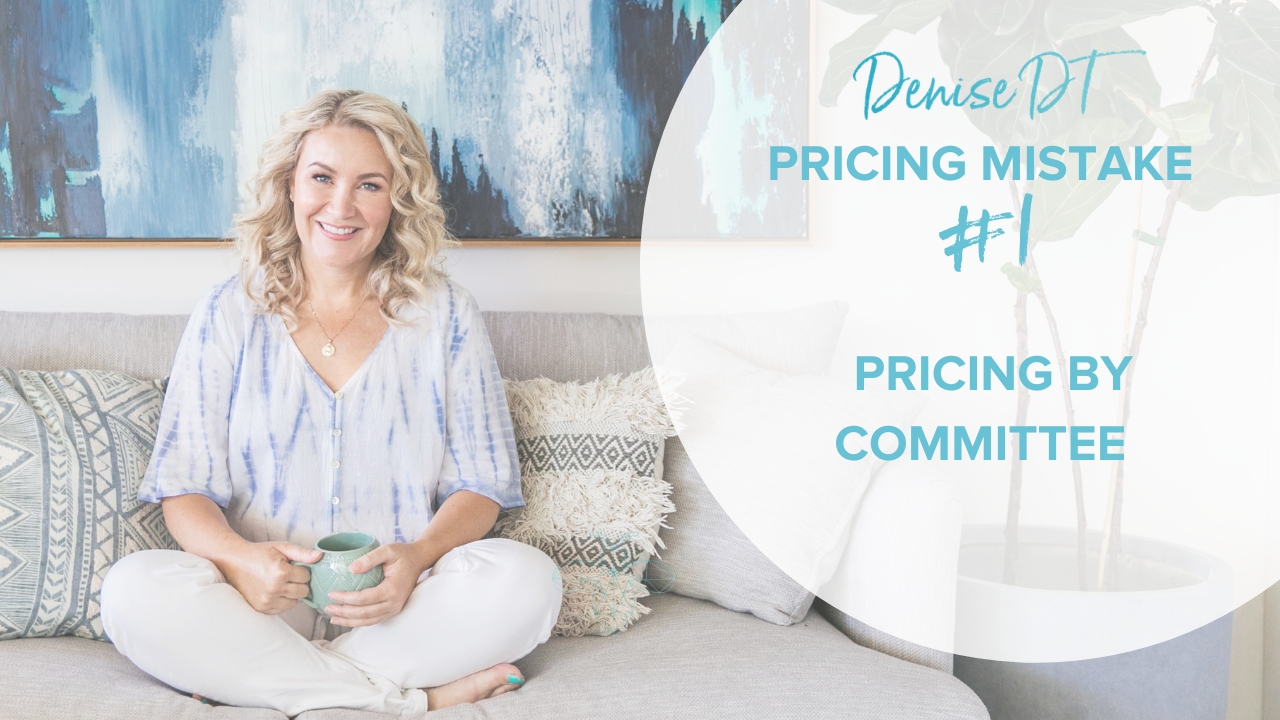Pricing Mistake 1: Pricing By Committee

A simple question that’s often difficult to answer for business owners is: “So, how much does it cost?“
When asked that, do you stammer, try to justify, or deflect the question?
I have, many times!
Now that I’m on the other side of it, I get impatient when a business owner clearly doesn’t want to tell me how much something costs.
Please, just tell me the price so I can pay it! It’s annoying!
I’m Denise Duffield-Thomas, money mindset mentor, author and founder of the Money Bootcamp and today we’re talking pricing and one of the big mistakes I see entrepreneurs make when setting their prices.
When I started out as a fledgling life coach, I was just as clueless about pricing as everyone else.
I had never had to think about it before—all of my previous jobs either had fixed day rates set by my boss (when I was a consultant) or were an internal cost to the company (when I was an event planner for a non-profit organization).
I didn’t like having salary conversations and never asked for a raise or bonus.
I took what I was offered (like a good girl) and never thought I was worth more.
When I decided to go into self-employment as a full-time life coach, it was suddenly my responsibility to assign a monetary value on my skills, and that was scary.
Too expensive would make it look as if I was too big for my britches, too cheap and I’d look inexperienced.
I wished someone would just tell me what to charge.
In working with thousands of women over the years, I’ve seen pricing patterns emerge among the mistakes they make and believe me, I’ve made them all too!
Knowledge is power, though, and if you’re aware of these mistakes, you can recognize them when they arise so they’re less likely to derail you.
The first big pricing mistake is Pricing by Committee
The worst thing you can do is ask other people what they think you should charge.
It’s an innocent mistake: As women, we think we’re being inclusive, collaborative, and harnessing the wisdom of others by asking them for their opinion.
But it’s a dangerous practice.
Here’s why: Every time you set your prices by committee, you’re taking on other people’s beliefs around money, regardless of their qualifications, experience, or money mindset.
Imagine that your money blocks are physical things— like rocks—and you have to carry them around in a backpack.
Obviously, the more money blocks you have, the harder you have to work just to go about your daily life.
When you crowdsource your pricing, you’re not just carrying your backpack of money blocks, you’re taking on everyone else's. It’s like carrying 50 backpacks at once!
Not all feedback is useful.
If you don’t believe me, try it yourself.
Go to your favorite business forum and ask a pricing question.
You’ll be astounded by the variety of responses. Everyone has a different perspective on “worth“ and “value.“
Before you pay any attention to what others say, ask yourself the following questions.
‘Are They My Target Audience?’
Taking advice from people who are nowhere near your target market, for example, your husband, uncle, or a random stranger, is a big mistake (don’t laugh, I’ve done this!).
I remember talking to a 50-something guy about my business at a networking event and, in a conversation about what I did, he said, “Wow. That sounds like you’re charging too much.“ I felt chastised and embarrassed because he was reflecting my own worst fears about my business and said, “Yeah, I think you’re right.“
This dude was the complete opposite of my target market, but I let his opinion sway one of my most important business decisions.
His opinion of my pricing could have been based on what his own target market could afford or on something more sinister, like an ingrained misogynistic view of what women are worth.
Either way, it was totally useless, but the interaction played on my mind for days.
He wasn’t my coach, and he wasn’t a pricing or marketing expert. He knew nothing about my business or target market.
He just made a snap decision based on what he “felt“ was too expensive, and I believed him!
His opinion was none of my business, so why was I soliciting it?
Why even have a money conversation with some generic dude or random stranger?
Honestly? Because I didn’t want to think about it.
I wanted someone else to tell me what to charge so I didn’t have to confront my fears about money.
I thought someone else would know better than me.
If you have a specific niche (and you definitely should), then how tightly do the people offering their opinions fit that profile?
For example: age, gender, geographical location, income level, stage of life, or business.
If your ideal target market is parents of newborns who have a healthy income, why would you take the opinion of a childless senior citizen or vice versa? It doesn’t make sense!
If you market to other business people, what stage of business are they in? What’s appropriate for a beginner to pay is entirely different from someone who’s financially successful in business.
Nobody knows more about your business than you do.
Nobody knows your target market’s hopes and dreams as well as you do.
And nobody is more deeply and emotionally connected to your business goals than you are.
Another question to ask yourself is;
‘Are They in The Market For What I Do?’
Until people actually need something, they don’t really know what they’d pay for it.
My Goddess, when I think of what I’ve paid for things, either because I needed them ASAP, or because I got excited about the results I was promised.
Literally hundreds of thousands of dollars by now! If you’d asked me what that product or service was worth beforehand, I probably would have vastly underestimated what I would’ve paid.
My budget is way more flexible than someone starting out in business and, to be honest, my time is worth more now, so I’m willing to pay to outsource to an expert.
I’ve always appreciated paying for professionals in my business, for example, copywriters, to help me with sales emails.
But I never considered paying a ton of money for copywriting until I needed to create 35 scripts in two weeks for a new course I was filming.
I procrastinated it until I had no choice.
I ended up paying four times my budget because I was suddenly in the market and needed it done ASAP!
It was totally worth it even though I had unrealistic expectations about what I should pay.
So, unless, the people giving you advice represent your target market and need you now, they won’t give you accurate or useful help at all.
If you need a ballpark figure, a better question to ask your business buddies would be, “What do you do, and how much have you paid for X?“
For example, “If you’ve been in business for at least two years, what did you pay for your website?“ or “Hey health coaches: What did you pay for your website photography?“
That way, you’re getting the advice of people who have put some money in the game, and it’s useful market research rather than confusing random opinions.
Asking Competitors or Peers
What about other people in your industry?
Should you ask them or sneak a look at their prices and place yourself accordingly?
Again, this isn’t even remotely helpful.
You might decide that the seniority (or popularity) of your peers means that you can’t charge as much as or more than they do.
I decided at the start of my business that I didn’t deserve to charge as much or more than established coaches who were decades older than me, regardless of their skill level.
Maybe you’re judging yourself against the “popular girls“ in your industry and think that social media follows mean superior experience.
Now, that sounds reasonable on the surface, but I was discounting my years of adjacent coaching and mentoring experience, of which I had plenty—both in jobs and as a volunteer.
In my own mind, that didn’t “count,“ and I told myself I needed to start at the bottom of the ladder.
Longevity doesn’t always mean you’re great at your job. I know lots of “experienced“ coaches whose skills have been stagnant for years and, frankly, aren’t that great. Maybe you know those types too?
Plus, look at professions like social media management.
A long career in that field isn’t even possible since technology changes so quickly. In a case like that, results and knowledge are just as valuable as experience.
Lastly, your industry might have massive money blocks (the alternative healing professions come to mind) so remember, when you’re averaging out the competition, you’re basing your income potential on collective insecurities and industry myths.
Money coach Kendall Summerhawk says it best; “Don’t base your net-worth on someone else's self-worth.“
So, if you can’t survey your audience (or a rando guy down the street), and if you can’t sneak a look at what your competitors are charging, what’s a Chillpreneur to do?
The simple answer is: You have to trust in your own wisdom and set your own prices.
Nobody is going to do that for you. Just pick a price and try it out.
The truth is that what you charge is entirely personal and not as black and white as you’d think.
You’re looking for the “Goldilocks sweet spot,“ which is the just right price for you, regardless of what other people charge.
In an interview that I conducted with author Danielle LaPorte, she called this being “comfortable in your money shoes.“
It has to be the right fit.
Too big price-wise and you’ll feel like a fraud, like you’re a little girl playing dress-up in your mama’s high heels.
But wearing too-tight money shoes that you’ve outgrown (prices that are too small) is incredibly uncomfortable too.
You have to feel as if you’re in alignment and in integrity with your rates, and only you can decide what that is for your business.
Sorry!
While I can’t tell you what to charge, I can help make sure that your money blocks don’t sabotage your pricing and your ability to receive.
I’ve got a free workshop all about identifying and clearing the seven most common money blocks.
Watch it today at DeniseDT.com/Blocks
You deserve to be paid beautifully and when you set the right price your sending a powerful message to the universe that you’re ready to receive.
It’s your time and you’re ready for the next step.
Denise x
PS: To nail your pricing strategy in your business I’ve got an awesome bonus for you. Change your money mindset (and life) with the exercises and ideas that I share in my Ultimate Guide to Pricing. Get your copy here.
P.P.S: Dive Deeper:
- Read Pricing Mistake No. 4 on why you shouldn’t take it personally when someone says you’re too expensive. That’s their stuff – believe me!
- Read Pricing Mistake No. 3 - why you shouldn’t work for free
- Read Pricing Mistake No. 2 on the damaging effect of undercharging and overdelivering – yes, it CAN affect your whole life!
FREE MONEY MINDSET TRAINING
The 7 Most Common Money Blocks and How to
Clear Them
Discover which blocks are keeping you under-charging, over-delivering and from earning what you're worth!
Register now for instant access




